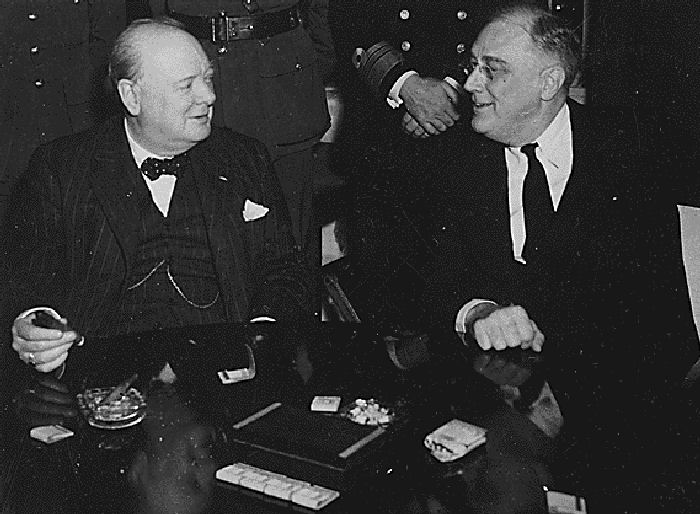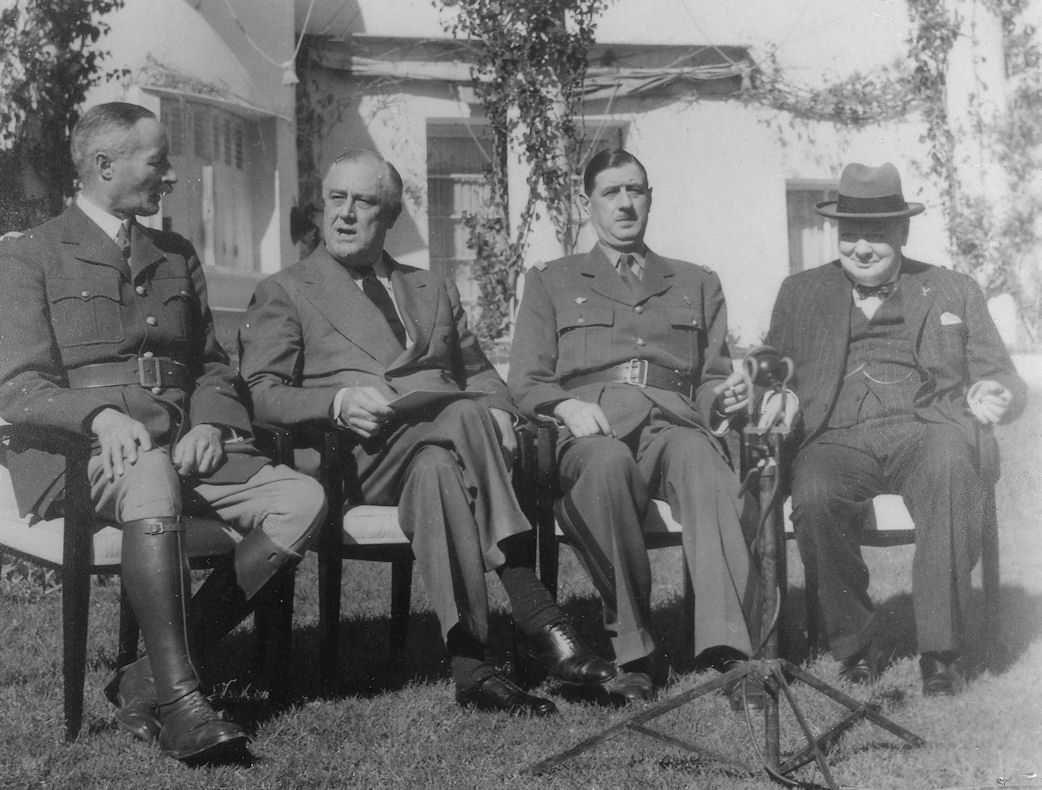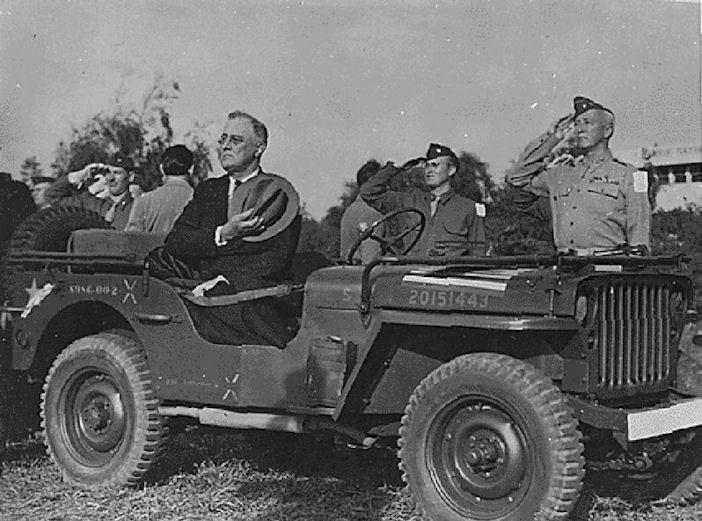![]()
The Charlotte News
Tuesday, February 2, 1943
FOUR EDITORIALS
![]()
![]()
Site Ed. Note: With the capture of Zernovoy, the Russian army had penetrated, according to the front page, to within 40 miles of Rostov, with further penetrating movements calculated to recapture Kursk, Kharkov, and Kranodar, the latter a rail junction on the Kuban River and one of two remaining German bases in the western Caucasus region, to which three separate pincers were aiming, one having reached a point 37 miles from Kranodar, a second within 30 miles, and the other, 56 miles away.
A German prisoner in Russia related the story that 49 Hungarian officers had been, upon attempted surrender, summarily executed by a German officer, one Lt.-Col. Lentz.
In Stalingrad, the freezing, starving German prisoners, turning up their collars to the icy winds, told of their last days before surrender, during which their provender consisted of horses, cats, and dogs.
In Tunisia, fighting continued in an effort by the Allies to recapture the important Faid Pass, and to advance the pincer movements from the northwest and west toward Maknassy, while the British Eighth Army continued to duel with Rommel's rearguard in the vicinity of Zuara near the Libyan-Tunisian border, to forestall, cut around and swallow Rommel's forces, otherwise stacking up behind the Mareth Line to the northwest.
It was rumored that shortly General Eisenhower would be promoted to full general and would assume the joint command of all Allied forces in North Africa, as the Eighth Army moved toward joinder with the other Allied forces operating in Tunisia.
The largest Allied air raid yet to hit Rabaul on New Britain, off New Guinea, was reported, with 20 to 50 enemy planes destroyed.
Churchill was reported, after leaving Casablanca, to have flown to ostensibly neutral Turkey to meet with President Inonu, to assure him of a commitment by the Allies to bolster Turkish defenses against possible incursion by Hitler from either the Balkans to the west or from the north in the Black Sea.
The German press, however, yawned at the prospect, considering the German pact made with Turkey and previous provision of Nazi military aid to the country to inhibit any prospect of more than passively amicable relations with the Allies, while it recognized a belief that the Casablanca Conference had, as one objective, discussion of Allied plans to expand the war into the Middle East.
The Prime Minister's visit, if nothing else, therefore acted as a deliberate foil by which to keep Hitler guessing as to the next point for an Allied thrust, causing him to have to maintain his troops scattered throughout the Balkans, Greece, and along the northern rim of the Mediterranean, in southern Italy and France, continuing the weakened status of the thinned out lines in Russia since mid-November.
President Roosevelt spoke to a press conference anent his 17,000-mile roundtrip to Casablanca, stressing that a principal resolution of the conference was the reaffirmation, made in previous conferences with Prime Minister Churchill, that no armistice would be acceptable as that which ended World War I, but only unconditional surrender by the Axis nations. Without providing any hint of detail, he stated that plans had been laid at the conference for Allied military operations to ensue during the entire calendar year of 1943.
Thus, the plans for invasion of Sicily and Italy, once North Africa was secure for the Allies, were now on the table.
He added that General Giraud had assured that he would be able to place an army of 250,000 trained Frenchmen into the field in Tunisia within the near term.
Also printed on the page is the Presidentís three-week itinerary of the trip. Missing is his trip to Belfast where he had, as reported the previous week, addressed the Allied troops stationed there, preparing themselves for the next Expeditionary Force.
It is related that during his trip to Rabat, Morocco, the Secret Service, fearful of possible trouble from the small percentage of French in the area, resorted to schoolboy antics to distract attention as they drove along Moroccan roads in an open Jeep with the President. Upon noticing a European, one of the President's guard would point to the sky and shout, "Look!" whereupon the unsuspecting observer would look to the sky, expecting to see a plane or bird, or perhaps, the Man of Tomorrow. Other tactics included having one of their number pretend to fall out of the Jeep while another quickly restored the wayward passenger's momentary loss of balance.
The same article points out that the President was accompanied by five WAAC's at the Conference who took notes, these five ladies having survived a torpedo to their transport, having arrived in Morocco without clothes, as he related to his audience amid nervous laughter--excepting, he quickly appended, those garments which they wore on their backs.
Perhaps the Secret Service might have used yet another bit of prestidigitation, utilizing the WAACs' state of habitual distress to provide further distraction to the European men along the desert track.
The President had his birthday on Saturday aboard his plane flying over Haiti, receiving gifts picked up by his entourage in Trinidad. We trust that among the presents was no Voo-doo doll by which he might have sought to resist the new, more conservative Congress elected in 1942, to distract them into continued support of New Deal economic and domestic policies.
On the editorial page, Dorothy Thompson calls for definition of principles to inform the term "unconditional surrender" as set by the Allies as the only acceptable goal in the war, that mere treaties were not enough, having proved themselves worthless pieces of paper after Versailles. She again advocates a world governing organization--that which became, after the war, the United Nations General Assembly and Security Council--to provide these principles and have the teeth to enforce them through time.
Samuel Grafton writes in general disgust of the contrast between that which had been ongoing in French North Africa for three months since the Allied landings, continued Fascist rule, continued anti-Semitic policies, continuation of Fascist clubs and political organizations, and that which the British had accomplished in less than a day after moving into Axis-abandoned Tripoli: freeing of the Jewish Ghetto which had crammed into it 16,000 persons, living, as one reporter had described, in what appeared as a "rabbit warren"; abolition of all racial laws which had been imposed by the Italian Fascist government; jailing Fascists and freeing democrats. In Casablanca, Mr. Grafton cites as disparate example, the democrats remained in prison while the Fascists continued to roam the land freely. He wonders why this disparity of treatment remained. It was not, as had been reported, in deference to the Arab population, for there were plentiful Arabs in Tripoli who, after the Allied occupation, were getting along well enough with the other citizens of the city, no longer segregated.
"Big Pincers", along with Raymond Clapper's piece, voices optimism at the Allied chance of obtaining unconditional surrender from Germany within the year. Mr. Clapper compares the debacle now facing Hitler with that of Napoleon after his great victory at Borodino, enabling the capture of Moscow, only to find the Russians inhospitable to him and his army, continuing their impolite guerrilla tactics until the French, in defeat, fled down the Smolensk road, back from whence they had come. He admits that, during the previous summer, as he read War and Peace, he put little hope in the chances of the Russians' ability, as they had in the winter, to stop the thrust of the Nazis into Stalingrad and the Caucasus. But now, with the victory in New Guinea and Guadalcanal, with the retreat of Rommel before the Eighth Army from Egypt and Libya, all combined to fix a date of terminality for the Third Reich and the Japanese military machine. Clapper predicts no more than two more years; Burke Davis inclines toward the view of Admiral Halsey, with which MacArthur had also recently hinted agreement, that another year ought see the end of the war.
"Cover-Up" comments adversely on Edward Flynn's manner of withdrawing his nomination to be Minister to Australia. The editorial refuses to accept that he withdrew, as claimed, because of political shenanigans arranged against the President by Republicans. For, as it states, the real reason was that many a Democrat in the Senate was prepared to vote against confirmation based on the unseemly past of the nominee as a political ward boss in New York.
Below, we include four photographs of President Roosevelt and Prime Minister Churchill meeting with Generals De Gaulle and Giraud, and FDR separately with General Patton, in Morocco during the Casablanca Conference, as well as FDR visiting Liberia during his return leg, the first time an American President had ever gone into a foreign war zone, and the first time since Lincoln visited Grant across the Potomac that any sitting President had entered a war zone anywhere.
We note, this Groundhog Day, that no mention of the occasion was made on either the front page or the editorial page, contrary to past years when Cash was writing for The News.
But now, with war omnipresent throughout the world, was not a time for considering too much how long winter might last, for winter, everyone knew, would still be as chilly as ever well into the humidity of summer, even as leaves cascaded to the ground in fall, as more and more telegrams reached anxious families, explaining why their son or husband or brother or father would never again cast his shadow on their doorway.
Where we are today, it was gray and thus no shadow did the groundhog see, missing that circumstance by a day. There is plentiful snow on the ground. Thus, we have no reason to doubt the prognostic as accurate this year.
A couple of days ago, we were, by the extant conditions outside, delivered of the thought as to the etymological origin of the term "snowbird", as applied to clear shots proximal to the opponent's basket in the old clockwork orange routine. Not too many announcers, indeed none who we hear these days, any longer, for whatever reason for its disuse, utilize that term. But it used to be in frequent expression during the 1960's. Now, they just say, void of poetic prose, dry and colorless, jejune, in explication of the condition, "There he goes, in for an open lay-up."
We used to wonder at that esoteric metaphor: why "snowbird"? Was it because of the solitary nature of this polar bird? Or due some other, more cryptically discerning exegesis to divine its orgin?
Then, two days ago, it suddenly struck us, as we walked along the lane alone amid the snowdrifts: must be from a conflated, hyphenated "bluebird" combined with "snow glistening in the lane" to form in some poetically inclined announcer's mind one snowy night somewhere, during the fevered heat of an orange contest, "snowbird".
In any event, Sunday night, after we came to that conclusion, our school's opponent, the Wahoos, had occasion to come to Chapel Hill, where they are usually apt to lose, but this time scored quite a number of snowbirds in a short period of four minutes to open the second half, sufficient in number quite to vanquish our school in a torrent of snowbirding activity, such that they suddenly found themselves behind twenty points. We suggest to our team, therefore, that they perhaps devote some practice to snowbirds and defense of same, and without walking down the lane.
We recommend a few laps out on the old track in the snow, actually, to get the blood circulating again. Then perhaps, of the next seven games, they might win more than two.
Remember what Georgie Patton said.

FDR and Churchill, January 18, 1943, Casablanca

General Giraud, FDR, General De Gaulle, Churchill, Casablanca

FDR and General Patton, reviewing troops, January 18, 1943, Casablanca

FDR, Liberia, January 27, 1943
![]()
![]()
![]()